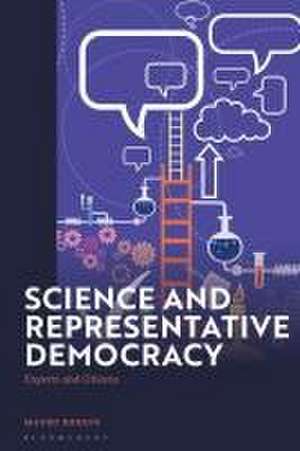Science and Representative Democracy: Experts and Citizens
Autor Mauro Doratoen Limba Engleză Paperback – 18 sep 2024
| Toate formatele și edițiile | Preț | Express |
|---|---|---|
| Paperback (1) | 190.16 lei 3-5 săpt. | |
| Bloomsbury Publishing – 18 sep 2024 | 190.16 lei 3-5 săpt. | |
| Hardback (1) | 509.45 lei 6-8 săpt. | |
| Bloomsbury Publishing – 22 mar 2023 | 509.45 lei 6-8 săpt. |
Preț: 190.16 lei
Preț vechi: 248.72 lei
-24% Nou
Puncte Express: 285
Preț estimativ în valută:
36.39€ • 39.65$ • 30.66£
36.39€ • 39.65$ • 30.66£
Carte disponibilă
Livrare economică 02-16 aprilie
Preluare comenzi: 021 569.72.76
Specificații
ISBN-13: 9781350277762
ISBN-10: 1350277762
Pagini: 200
Dimensiuni: 156 x 234 x 25 mm
Greutate: 0.28 kg
Editura: Bloomsbury Publishing
Colecția Bloomsbury Academic
Locul publicării:London, United Kingdom
ISBN-10: 1350277762
Pagini: 200
Dimensiuni: 156 x 234 x 25 mm
Greutate: 0.28 kg
Editura: Bloomsbury Publishing
Colecția Bloomsbury Academic
Locul publicării:London, United Kingdom
Caracteristici
Details the analogies between the formation of consensus in science and democracy through notions of free discussion and criticism
Notă biografică
Mauro Dorato is Professor of Philosophy of Science at Roma 3 University, Italy.
Cuprins
List of Figures AcknowledgmentsIntroduction1. Historical Prologue: The Lippmann-Dewey Debate 2. How Does Science Work? The Evaluation and Controllability of Scientific Hypotheses 3. How Does Democracy Work? The Balance of Powers 4. Representative Democracy, Direct Democracy, and Scientific Specialization5. Scientific Disinformation and Distrust in the Experts 6. How to Navigate in the Disagreement of Experts: The Need for Greater Scientific Literacy 7. The Role of the History and Philosophy of Science in the Democratic Debate Conclusion Notes References Index
Recenzii
This is a clear and engaging discussion of how science and liberal democracies share a commitment to analogous norms and values, and of how citizens can be empowered by scientific literacy. It is recommended to those interested in finding out what it takes to contribute meaningfully to public debate in contemporary democracies.
Mauro Dorato adopts a fresh approach to analyzing science and democracy from the joint angle of problem-solving. He seeks to resolve the apparent conflict between political values and interests, for one, and scientific knowledge and expertise, for another. As he argues, politics is based on scientific insights, while science proceeds by striving for a consensus in the scientific community. A remarkable explanation of how science and democracy illuminate each other.
In a period in which democracy and science are under threat, questioned, but also brandished as political rhetoric against enemies, this soft spoken and in depth reflection on their meaning, their value, and their intimate relation is welcome and important for us all.
Mauro Dorato adopts a fresh approach to analyzing science and democracy from the joint angle of problem-solving. He seeks to resolve the apparent conflict between political values and interests, for one, and scientific knowledge and expertise, for another. As he argues, politics is based on scientific insights, while science proceeds by striving for a consensus in the scientific community. A remarkable explanation of how science and democracy illuminate each other.
In a period in which democracy and science are under threat, questioned, but also brandished as political rhetoric against enemies, this soft spoken and in depth reflection on their meaning, their value, and their intimate relation is welcome and important for us all.
